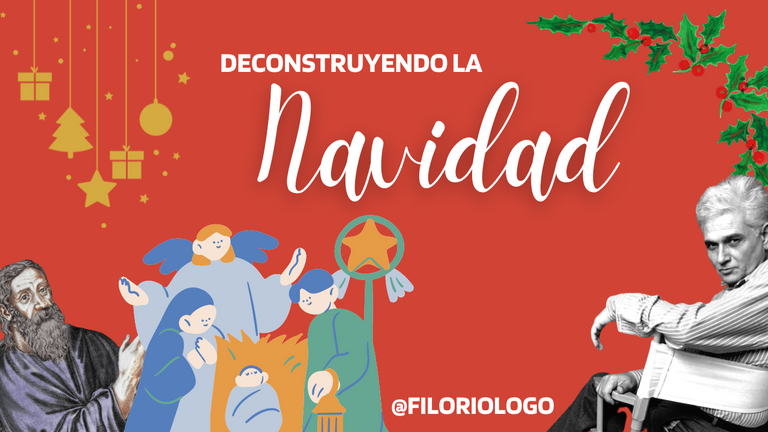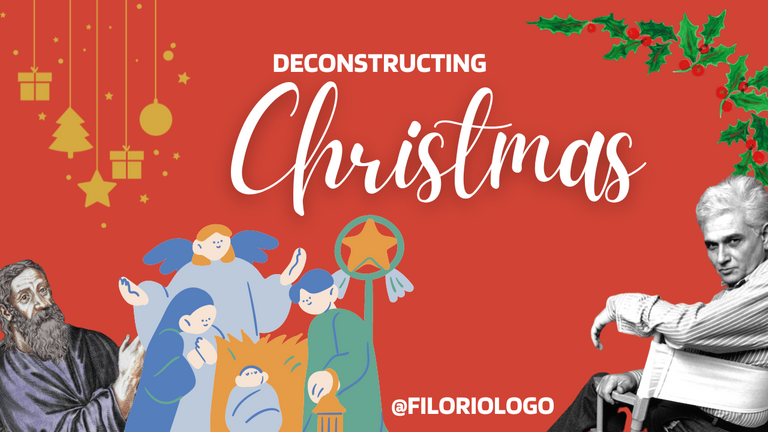ESPAÑOL
Deconstruyendo la Navidad

Hace varios días publiqué un pequeño escrito “Un nuevo Belen: Una mirada actual al mito de la encarnacioón” como un intento de aproximación al mito de la encarnación de Jesús. Con el pasar del tiempo hay tradiciones que se fijan en la idiosincrasia de los pueblos, de modo que siempre estamos de cara a costumbres que por lo general influencian de algún modo nuestra cosmovisión. Es por ello que la filosofía siempre pretende ser un ejercicio de repensar lo cotidiano, de desaprender para aprender nuevamente en la búsqueda interminable del conocimiento.
La navidad es de las festividades que más mueve a las personas en el año, y no solo en sentido espiritual, me atrevo a decir que el modo de celebrar la navidad está apegada a los tiempos y parece que el mensaje esencial de la navidad queda un poco olvidado. Pienso que tal síntoma social no es más que un efecto del olvido y el ocultamiento. El status quo no le importan los contenidos que han llevado a las festividades a ser lo que son, días conmemorativos en función de algo ulterior, algo inmanente a la festividad en sí, y es por ello que ha nacido en mí el deseo y la voluntad de escribir un poco sobre la navidad pero invocando una suerte de reflexión que parta de la deconstrucción que nos invita a hacer el filósofo francés-argelino Jacques Derridá. De este modo poder mirar con un poco más detenimiento la navidad y lo que ella conlleva, no es solo una cuestión de juntarse para comer platillos especiales y dar obsequios.
Ante todo quiero dejar en claro que pretendo ser lo más honesto intelectualmente hablando y lo que aquí leerás a continuación es el fruto de numerosas lecturas y conversaciones con profesores de historia y filosofía. Debo dejar en claro que tampoco soy un experto en el método de deconstruir, pero bien sé que acercarnos por esta vía nos va a permitir tener un panorama que quizá no habíamos considerado. Tampoco soy un experto en la historicidad de estas festividades, más bien lo que en mi subyace es el deseo de proporcionarme un panorama diferente. Por lo general escribo para entender, y me gustaría darle una visión diferente a este asunto de la navidad.
Así que partamos de la pregunta: ¿Por qué navidad? y ¿Por qué celebramos navidad los días 25 de diciembre? Alrededor de estas dos preguntas circundan las respuestas más obvias y que no siempre lo obvio es la respuesta correcta. Quizá podamos toparnos con respuestas tipo: La navidad es la conmemoración del nacimiento de Jesucristo y se celebra el 25 de diciembre porque fue el día en el cual nació, pero esto no es del todo cierto. Si es cierto que navidad es la conmemoración del mito de la encarnación, pero, no es cierto que haya nacido un 25 de diciembre, entonces ¿La navidad es una farsa? No es tan así, la conmemoración de una festividad no depende de una fecha, más bien la fecha es escogida con cierto propósito. Pues bien, en torno a la fecha del nacimiento de Jesús hay mucho que decir, la biblia no dice en qué fecha nació Jesús, lo que sí nos dice es que habian pastores, de modo que podemos deducir que no era en el mes de diciembre ya que en esta época era invierno y los pastores no salían a pastar sus rebaños en invierno, por lo tanto, aunque la biblia no nos dice cuando nació, lo que sí nos dice es cuando no nació.
Entonces ¿Por qué se ha escogido el 25 de diciembre como fecha para conmemorar el nacimiento de Jesús? En pocas palabras, el 25 de diciembre era una festividad en el antiguo imperio romano, ya que se celebraba la fiesta pagana del nacimiento del sol, la llamada fiesta del “Sol Invictus”. Ya que días atrás, el 21 de diciembre es la noche más oscura del año. Y la iglesia para “bautizar” la fiesta pagana, escoge poner el nacimiento del mesías el 25 de diciembre, ya que el representa de algún modo ese sol invicto, ya que por fe Jesús venció a la muerte. Así fue el papa Liberio I en el año 354 que estableció que el nacimiento de Jesus se celebraría el día 25 de diciembre, y como dato curioso en ese año año que nació Agustín de Hipona, mayormente conocido como san Agustín. .
La cristiandad ha logrado sustituir el espíritu pagano por una festividad propia, de la fecha exacta del nacimiento de Jesus no se sabe nada en sí, porque en pocas palabras se puede decir que para los primeros cristianos esto no era algo relevante. Fue Clemente de Alejandría, filósofo cristiano del siglo 2 y primer miembro de la iglesia de Alejandría quien sitúa el nacimiento de Jesús en el mes de mayo, que viene a ser en el calendario egipcio el mes de Pajón, este dato parece coincidir con el ambiente primaveral que menciona el evangelista lucas.
“Había unos pastores en la zona que cuidaban por turnos los rebaños a la intemperie” Lucas 2, 8.
Y como bien lo he dicho anteriormente, los datos bíblicos no nos dicen cuando nació, pero parece darnos ciertos indicios, y saber algunos detalles que a simple vista parecen irrelevantes, pero desde una mirada más amplia son datos importantes. Siglos más tarde, en el año 531, el papa Juan I mandó a llamar a un famoso astrónomo de la época, Dionisio “el exiguo” monje erudito que creó el cálculo del año del señor (Anno Domini) para calcular la fecha exacta de la pascua, ahora bien, por petición del papa, se propone averiguar la fecha exacta del nacimiento de Jesús. Este matemático al parecer llegó a la conclusión de que Jesus nació 753 o 754 años después de la fundación de Roma. Esto implicaba un severo problema con las fuentes bíblicas, pues bien, según el evangelista Mateo, afirma que Jesús nació en tiempos de Herodes el Grande,y este murió en el año 4 de nuestra era, por lo sobrepasa por aproximadamente 3 años a los cálculos realizados por el monje Dionisio.
De modo que a todos estos datos mencionados podemos añadirle un par de datos más, sumemos el tiempo que Jesús pasó en Belén y además tomemos en cuenta la matanza de los inocentes que realizó Herodes, Dionisio llega a la conclusión de que Jesús nació aproximadamente 5 o 6 años antes de su propio nacimiento, es decir, que Jesucristo nació 5 años antes de Jesucristo, o eso es lo que más o menos se estima, en este asunto no hay una certeza exacta y aunque parezca un juego de palabras es interesante temporalmente sucede algo curioso, si situaremos el año 0 el dia del nacimiento de Jesús, viviríamos en el año 2028 aproximadamente, pero esto es algo irrelevante.
Los datos bíblicos no nos dicen mucho, más allá de ofrecernos indicios que no nos hacen llegar a mucho en el sentido de la historicidad de los hechos, ya que la prioridad de estos relatos es un mensaje de fe y no exactitud histórica. Y sabiendo que esto es así, ¿Por qué entonces recurrimos a los evangelios? Es más, podría suscitarse la pregunta, ¿Por qué si existen aproximadamente 80 evangelios, solo recurrimos a los 4 evangelios bíblicos? Y más allá de afirmar que sólo se recurre a Marcos, Mateo, Lucas y Juan para acercarse a Jesus, hay que entender la cronología de estos evangelios, en sentido estricto son los más cercanos a Jesús.
Marcos escribe hacia el año 60 más o menos, Mateo hacia el año 80 o 90 al igual que el evangelio de Lucas, y se estipula que el evangelio de Juan se ha escrito hacía el año 90 o 100. Es decir, se escribieron hacia el primer siglo, los demás evangelios se escribieron hacia el siglo 2, ya por cronología se asume que se pierde mucho en estos evangelios posteriores.
Y aunque parezca que este escrito se ha ido un poco hacia otro lugar, hay que comprender que la navidad es en el fondo una fiesta cristiana que ha surgido como una respuesta de cristianizar una festividad ya existente, de modo que nos invita a pensar que ya desde sus orígenes no hay una “pureza” en el cristianismo, sino que en sus orígenes el sincretismo era parte de su cotidianidad, y fue con el Emperador Constantino que la cristiandad formó parte oficial del imperio, y solo entonces se comenzó a celebrar la navidad, y no viene significar otra cosa que la prevalencia de Jesús sobre el sol, o quizá que para el cristiano Jesús es ese sol invicto.
En realidad la navidad en la antigüedad era muy diferente a como la vivimos hoy, en realidad no era tan importante porque además, por varios siglos a partir del siglo IV, se comenzó a dudar sobre la existencia real de Jesus, pero eso es otro tema, basta con decir que actualmente se ha comprobado la existencia de Jesús, aunque el Jesús histórico no es el mismo que el Jesús bíblico pero eso lo explicamos luego.
Hoy en día concebimos una navidad sin regalos, pero no siempre fue así, al parecer esto de los regalos comenzó con la reina Victoria de Inglaterra que comenzó a dar regalos a sus hijos en estas fechas, de modo que hace menos de 200 años fue que comenzamos con la tradición de dar regalos. Y es por ello que no hay referencia alguna a la navidad en la biblia o en los textos de los primeros cristianos en sentido estricto, al igual que pasa con otras tradiciones, como hacer un pesebre en casa. Esta práctica la comenzó San Francisco de Asís, por otro lado la tradición del árbol de navidad es una tradición pagana que se cristianizó.
El sentido de la navidad en la conmemoración del nacimiento de Jesús responde a todo lo que implica el misterio de la encarnación. Por fe, se asume la divinidad de Jesús, y esto implica cierto problema, como ha sido posible que la divinidad se presente en tanto carne y hueso, y porque el modo en el que sucedió. Siempre he pensado que más allá de considerar el relato bíblico como un hecho histórico en sí, el verdadero mensaje del mito de la encarnación no es más que una lección de humildad. Cosa que me hace pensar en el sentido de la humildad hoy en día en nuestras celebraciones de navidad.
Navidad actualmente se ha convertido en una festividad bastante peculiar, en ciertos aspectos es bastante emotiva en otros aspectos no tanto, porque las personas se han dejado llevar por el status quo y todo gira en torno a los regalos que podamos dar y recibir, y no es que esté mal el dar y recibir obsequios, pero no es el centro de la festividad. Creo que la verdadera lección de humildad no debería evocar la pregunta ¿Cómo ser más humilde?
Y con esta pregunta me gustaría terminar este intento de ensayo, porque mueve a la reflexión y a la introspección, puesto que la misma vida de Jesús nos evoca un profundo autoconocimiento constante, desde su nacimiento hasta su muerte. Más adelante escribiré sobre otros temas en torno a Jesús ya que es un tema que me encanta y siempre me ha llamado la atención.

ENGLISH
Deconstructing Christmas

Several days ago I published a short article ["A New Bethlehem: A Contemporary Look at the Myth of the Incarnation"] (https://peakd.com/hive-186119/@filoriologo/a-new-bethlehem-a-contemporary) as an attempt to approach the myth of the incarnation of Jesus. With the passing of time there are traditions that are fixed in the idiosyncrasy of peoples, so that we are always facing customs that usually influence in some way our worldview. That is why philosophy always aims to be an exercise of rethinking the everyday, of unlearning in order to learn again in the endless search for knowledge.
Christmas is one of the festivities that moves people the most in the year, and not only in a spiritual sense, I dare to say that the way of celebrating Christmas is attached to the times and it seems that the essential message of Christmas is a little forgotten. I think that such a social symptom is nothing more than an effect of forgetfulness and concealment. The status quo does not care about the contents that have led the festivities to be what they are, commemorative days in function of something ulterior, something immanent to the festivity itself, and that is why I have born in me the desire and the will to write a little about Christmas but invoking a kind of reflection that starts from the deconstruction that the French-Algerian philosopher Jacques Derridá invites us to do. In this way, to be able to take a closer look at Christmas and what it entails, it is not just a matter of getting together to eat special dishes and give gifts.
First of all, I want to make it clear that I intend to be as intellectually honest as possible, and what you will read below is the result of numerous readings and conversations with history and philosophy professors. I must make it clear that I am not an expert in the method of deconstructing, but I know that approaching it in this way will allow us to have a panorama that perhaps we had not considered. Nor am I an expert in the historicity of these festivities, rather what underlies me is the desire to provide me with a different panorama. I usually write to understand, and I would like to give a different vision to this Christmas issue.
So let's start with the question: Why Christmas and why do we celebrate Christmas on December 25th? Around these two questions there are many obvious answers and not always the obvious is the right answer. Perhaps we can come across answers like: Christmas is the commemoration of the birth of Jesus Christ and is celebrated on December 25 because it was the day on which he was born, but this is not entirely true. If it is true that Christmas is the commemoration of the myth of the incarnation, but it is not true that he was born on December 25, then Christmas is a farce? Not so, the commemoration of a holiday does not depend on a date, rather the date is chosen for a certain purpose. Well, about the date of the birth of Jesus there is much to say, the bible does not say on what date Jesus was born, what it does tell us is that there were shepherds, so we can deduce that it was not in the month of December because at this time it was winter and the shepherds did not go out to graze their flocks in winter, therefore, although the bible does not tell us when he was born, what it does tell us is when he was not born.
So why was December 25 chosen as the date to commemorate the birth of Jesus? In a nutshell, December 25 was a holiday in the ancient Roman Empire, as the pagan festival of the birth of the sun was celebrated, the so-called "Sol Invictus" festival. Since days ago, December 21 is the darkest night of the year. And the church to "baptize" the pagan feast, chooses to put the birth of the messiah on December 25, since he represents somehow that undefeated sun, since by faith Jesus conquered death. Thus it was Pope Liberius I in the year 354 that established that the birth of Jesus would be celebrated on December 25, and as a curious fact in that year that Augustine of Hippo, better known as St. Augustine, was born .
Christianity has managed to replace the pagan spirit with its own festivity, the exact date of the birth of Jesus is not known, because in a few words it can be said that for the first Christians this was not something relevant. It was Clement of Alexandria, Christian philosopher of the 2nd century and first member of the church of Alexandria who places the birth of Jesus in the month of May, which in the Egyptian calendar is the month of Pajon, this data seems to coincide with the spring environment mentioned by the evangelist Luke.
“There were shepherds in the area who took turns tending the herds in the open.” Luke 2, 8.
And as I have said before, the biblical data does not tell us when he was born, but it seems to give us certain clues, and to know some details that at first glance seem irrelevant, but from a broader view are important data. Centuries later, in the year 531, Pope John I sent for a famous astronomer of the time, Dionysius "the meager" learned monk who created the calculation of the year of the Lord (Anno Domini) to calculate the exact date of Easter, now, at the request of the pope, he set out to find out the exact date of the birth of Jesus. This mathematician apparently came to the conclusion that Jesus was born 753 or 754 years after the foundation of Rome. This implied a severe problem with the biblical sources, because, according to the evangelist Matthew, he affirms that Jesus was born in the time of Herod the Great, and this died in the year 4 of our era, so he surpasses by approximately 3 years the calculations made by the monk Dionysius.
So that to all these data mentioned we can add a couple of more data, add the time that Jesus spent in Bethlehem and also take into account the slaughter of the innocents that Herod did, Dionysius concludes that Jesus was born approximately 5 or 6 years before his own birth, ie, In this matter there is no exact certainty and although it seems a play on words it is interesting temporarily something curious happens, if we place the year 0 on the day of the birth of Jesus, we would live in the year 2028 approximately, but this is something irrelevant.
The biblical data do not tell us much, beyond offering hints that do not make us arrive at much in the sense of the historicity of the facts, since the priority of these accounts is a message of faith and not historical accuracy. And knowing that this is so, why then do we turn to the Gospels? Moreover, the question could be raised, why, if there are approximately 80 gospels, do we only resort to the 4 biblical gospels? And beyond affirming that only Mark, Matthew, Luke and John are used to approach Jesus, it is necessary to understand the chronology of these gospels, strictly speaking they are the closest to Jesus.
Mark writes around the year 60 or so, Matthew around the year 80 or 90 as well as the gospel of Luke, and the gospel of John is stipulated to have been written around the year 90 or 100. In other words, they were written around the first century, the other gospels were written around the 2nd century, and by chronology it is assumed that much is lost in these later gospels.
And although it seems that this writing has gone somewhere else, we must understand that Christmas is basically a Christian holiday that has emerged as a response to Christianize an existing festival, so that invites us to think that since its origins there is no "purity" in Christianity, It was with the Emperor Constantine that Christianity became an official part of the empire, and only then did Christmas began to be celebrated, and it does not come to mean anything other than the prevalence of Jesus over the sun, or perhaps that for the Christian Jesus is the undefeated sun.
Actually Christmas in ancient times was very different from how we live it today, actually it was not so important because in addition, for several centuries from the fourth century, people began to doubt about the real existence of Jesus, but that's another topic, suffice it to say that currently the existence of Jesus has been proven, although the historical Jesus is not the same as the biblical Jesus but we will explain that later.
Today we conceive a Christmas without gifts, but it was not always so, apparently this of gifts began with Queen Victoria of England who began to give gifts to her children on these dates, so that less than 200 years ago was that we started with the tradition of giving gifts. And that is why there is no reference to Christmas in the bible or in the texts of the first Christians in the strict sense, as it happens with other traditions, such as making a manger at home. This practice was started by St. Francis of Assisi, on the other hand the tradition of the Christmas tree is a pagan tradition that became Christianized.
The meaning of Christmas in the commemoration of the birth of Jesus responds to all that the mystery of the incarnation implies. By faith, the divinity of Jesus is assumed, and this implies a certain problem, how it has been possible for the divinity to present itself as flesh and blood, and because of the way in which it happened. I have always thought that beyond considering the biblical story as a historical fact in itself, the true message of the myth of the incarnation is nothing more than a lesson of humility. Something that makes me think about the meaning of humility today in our Christmas celebrations.
Christmas nowadays has become a rather peculiar holiday, in some ways it is quite emotional in other ways not so much, because people have been carried away by the status quo and everything revolves around the gifts we can give and receive, and it is not that it is wrong to give and receive gifts, but it is not the center of the holiday. I think the real lesson in humility should not evoke the question How to be more humble?
And with this question I would like to end this essay attempt, because it encourages reflection and introspection, since the very life of Jesus evokes a deep constant self-knowledge in us, from his birth to his death. Later I will write about other topics around Jesus since it is a topic that I love and it has always caught my attention.

Otras|Other RRSS






